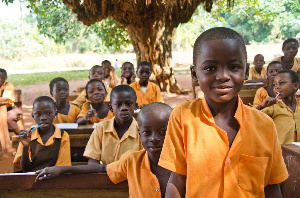- Home - News
- Polls
- Year In Review
- News Archive
- Crime & Punishment
- Politics
- Regional
- Editorial
- Health
- Ghanaians Abroad
- Tabloid
- Africa
- Religion
- Election 2020
- Coronavirus
- Photo Archives
- News Headlines
- Press Release
General News of Monday, 20 December 2021
Source: thebftonline.com
Basic education requires GH¢3.5bn to close infrastructure gap
Though the government has taken a huge amount of responsibility in the educational sector over the past five years, focusing attention on Free Senior High School (FSHS), allowances for teachers and development of some infrastructure to accommodate the rising student population at the SHS level, some GH¢3.5billion is still required to fix the sector’s infrastructural gap.
Recent assessments of the educational sector’s budget for next year by policy research and advocacy civil society organization SEND Ghana indicates that there are an estimated 5,403 schools in critical need of a facelift.
The breakdown includes 2,417 schools under trees and 2,986 dilapidated schools across the country, with most of these decrepit structures needing a new construction all together.
Unfortunately, the eight percent allocation to capital expenditure in education for 2022 will likely not be enough to address these infrastructural gaps.
Indeed, the government is hoping to acquire about 59 percent of funding for its educational CAPEX from internally generated funds (IGF), with 39 percent projected to come from donors and development partners.
“This situation is worrisome considering the volume of work that needs to be done in the educational sector, as there are several incomplete school blocks that must be completed; particularly at the secondary level,” SEND Ghana indicated.
Other challenges in the sector
SEND Ghana observes that after two years of implementing the new school curriculum, there are still no textbooks for primary pupils.
Indeed, in the 2020 budget government committed to developing, print and supply teaching and learning materials for 1.2 million kindergarten pupils; 1.6 million pupils in lower primary school; 1.5 million pupils in upper primary school; and over 1.2 million Teachers Guides for teachers from kindergarten to primary six. However, this has not been achieved – while the 2022 budget did not mention it or stipulate plans to implement it next year.
While the causes for the delay in printing textbooks remain unclear, SEND Ghana said the situation is creating unbearable conditions for basic schools and teachers alike.
“After two years of implementing the new curriculum, teachers at the basic education level have been using their guide pack but with no corresponding textbooks and workbooks for the pupils. Many pupils have been denied textbooks, and this is threatening their learning,” SEND Ghana observes.
Despite these challenges, all primary 4-6 pupils are expected to take an assessment test on proficiency and numeracy in early 2022, despite the unavailability of textbooks for schools’ teaching and learning activities.
Meanwhile, educational stakeholders have said it is prudent for Parliament to ensure there is fiscal space in the education budget for the procurement and distribution of textbooks to pupils before the assessment commences.
Entertainment










